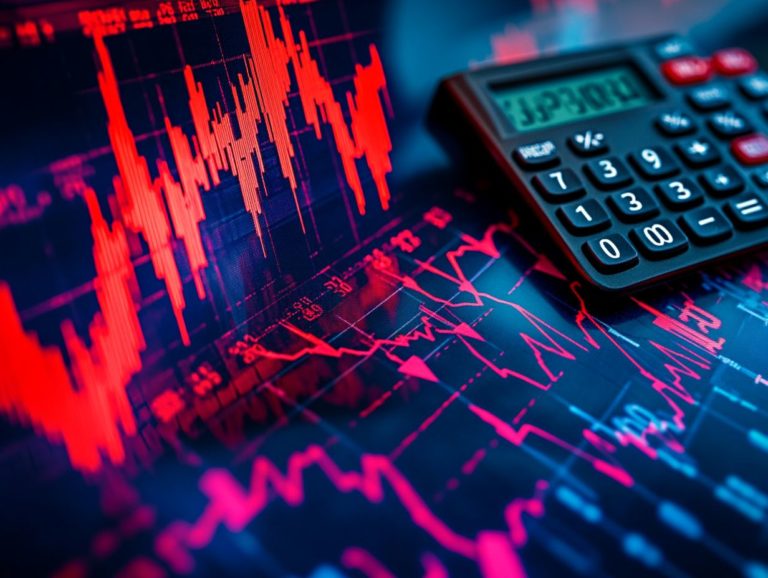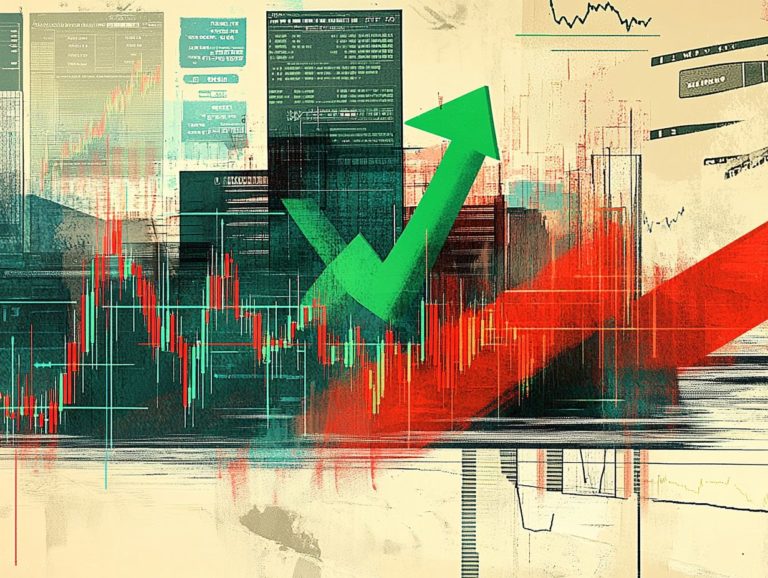How to Avoid Emotional Trading?
Emotional trading can easily throw you off course, even if you consider yourself a seasoned investor. It often leads to impulsive decisions that can result in significant losses.
This article delves into the nature of emotional trading and the underlying factors that drive it. It highlights the detrimental effects this behavior can have on your trading performance and offers practical strategies for effectively managing your emotions.
You’ll also learn about the importance of having a solid trading plan and knowing when it might be wise to seek professional guidance. By the end, you’ll be equipped with the tools necessary to trade with confidence and clarity.
Contents
- Key Takeaways:
- Understanding Emotional Trading
- The Impact of Emotional Trading
- Strategies to Avoid Emotional Trading
- Creating a Trading Plan
- Seeking Professional Help
- Frequently Asked Questions
- What is emotional trading and why is it important to avoid?
- How can you recognize when you are trading emotionally?
- How can you outsmart emotional trading?
- How can you manage your emotions while trading?
- What are the consequences of emotional trading?
- Why is it beneficial to seek professional help in avoiding emotional trading?
Key Takeaways:

- Recognize the signs and triggers of emotional trading, such as fear and greed, to prevent impulsive decisions.
- Emotional trading can lead to poor trading performance and significant financial losses.
- Develop a solid trading plan and stick to it, incorporating risk management strategies and setting realistic goals to avoid emotional decision-making.
Understanding Emotional Trading
Understanding emotional trading is essential for you as a trader aspiring to achieve long-term success in the financial markets.
It s all about recognizing how emotions like fear and greed can significantly influence your trading decisions.
When emotions take the driver s seat, impulsive actions often follow, which can negatively impact your trading performance and derail even the most meticulously crafted trading plan.
Being aware of trader psychology allows you to identify mental biases that might disrupt your profitable strategies, particularly during chaotic market moments.
By grasping the emotional facets of trading, you can better manage your investment behavior. This helps align your actions with your trading goals and objectives for a more disciplined and effective approach.
Defining Emotional Trading and its Causes
Emotional trading is when you make decisions based on your feelings rather than rational analysis.
This often leads to poor investment outcomes, fueled by mental biases like the fear of losing money and the fear of missing out (FOMO).
These biases not only affect your individual actions but can also sway the entire market.
Emotions tend to create waves of collective behavior that ripple through trading activities. For example, when you experience loss aversion, you might cling to losing positions far longer than necessary, convinced that a turnaround is just around the corner.
On the flip side, FOMO can push you into making hasty decisions, driven by the urge to seize perceived market opportunities, which can result in sudden price spikes.
Ultimately, these psychological factors can compromise your analytical thinking, leading you away from sound strategies. This not only jeopardizes your immediate goals but also poses risks to your long-term objectives, potentially exacerbating market volatility in the process.
The Impact of Emotional Trading
The influence of emotional trading can profoundly undermine your performance, resulting in a cascade of adverse effects that obstruct your capacity to implement a profitable trading strategy.
This emotional turmoil can disrupt your ability to adhere to a consistent trading plan, particularly in the face of fluctuating market conditions.
Negative Consequences on Trading Performance

Negative consequences on your trading performance due to emotional trading can show up in various ways.
These include impulsive decisions that veer away from your established trading rules and compromise effective risk management strategies.
Consider a scenario where you experience a sudden loss; the instinct to recover quickly might tempt you to over-leverage, potentially leading to even larger losses.
This cycle can chip away at your confidence, making it challenging to trust the trading system you once relied upon.
A case study of a trader who repeatedly ignored their set stop-loss measures serves as a stark reminder: they faced significant financial setbacks when unexpected market volatility struck.
By allowing emotions like fear and greed to dictate their strategies, many traders drift further from their predefined goals, making it nearly impossible to achieve consistent profitability over time.
Start managing your emotions today to secure your trading success!
Strategies to Avoid Emotional Trading
Implementing effective strategies to avoid emotional trading is essential for you as a trader aiming to elevate your performance and reach your trading goals.
These techniques foster emotional control and cultivate a disciplined mindset. This allows you to navigate the trading environment with greater confidence and precision.
Practical Techniques for Managing Emotions
Practical techniques for managing emotions in trading include utilizing positive self-talk, keeping a detailed trading journal, and practicing mindfulness. These strategies help cultivate emotional resilience during high-stress market conditions.
By integrating these strategies into your daily routine, you can develop a more disciplined approach to your decision-making process.
Employing positive self-talk can significantly reduce anxiety when confronted with unpredictable market fluctuations. Remind yourself, “I have prepared for this scenario,” which can bolster your confidence and help mitigate fear-driven choices.
Maintaining a comprehensive trading journal allows you to reflect on past trades, highlighting patterns or triggers that often lead to impulsive actions. This awareness enables you to identify emotional pitfalls and reinforces a more strategic mindset.
Practicing mindfulness techniques, like deep breathing exercises, grounds you during volatile sessions, helping you remain calm and focused under pressure.
Creating a Trading Plan
Don’t wait! Developing a robust trading plan is vital for your long-term success. Your plan needs to include a detailed trading strategy, clearly defined rules, effective risk management practices, and specific objectives tailored to your unique investment goals.
By doing so, you position yourself for greater clarity and effectiveness in your trading endeavors.
Key Elements of a Trading Plan to Prevent Emotional Trading

Key elements of a trading plan designed to prevent emotional trading include a well-defined risk management strategy, specific trading goals, and strict adherence to established trading rules that foster disciplined decision-making.
A comprehensive risk management strategy is essential as it protects you from significant losses. This allows you to stay in the market longer without the crippling fear of jeopardizing your capital.
Setting clear trading goals provides you with direction and motivation. This transforms potentially erratic trades into calculated decisions aimed at achieving measurable outcomes.
By strictly following established trading rules, you minimize the influence of emotion-driven choices. These often lead to impulsive actions that can undermine your long-term success.
Together, these elements create a robust framework that promotes consistency and resilience, enhancing your ability to navigate the complexities of the market with confidence.
Seeking Professional Help
Seeking professional support, whether through therapy or coaching, can be a transformative choice for you as a trader grappling with emotional trading. This approach delves into the underlying psychological factors that influence your investment behavior, ultimately enhancing your overall trading psychology.
Embracing this journey can enable you to navigate the markets with greater clarity and confidence.
When to Consider Therapy or Coaching
You should seriously consider therapy or coaching if you find yourself grappling with persistent emotional trading patterns that cloud your judgment, heighten your stress levels, or lead you astray from your trading plans. This is a clear sign that professional intervention is warranted.
These emotional ups and downs can manifest as impulsive trades when you’re riding high on confidence or as debilitating doubt during market downturns. Ultimately, this puts your financial well-being at risk. Engaging with a professional can help you identify and reshape those root habits.
With customized strategies at your disposal, you can cultivate emotional regulation techniques that sharpen your decision-making skills. Coaching also enables you to gain a clearer understanding of your personal strengths and weaknesses.
This allows you to better align your trading practices with your risk tolerance and goals. This holistic approach not only boosts your mental resilience but also paves the way for more consistent performance in the financial markets.
Frequently Asked Questions
What is emotional trading and why is it important to avoid?

Emotional trading refers to making investment decisions based on feelings rather than logic or strategy. It can push you into risky choices that could cost you dearly, resulting in potential financial losses. To make sound and profitable investment decisions, it’s crucial to understand the relationship between trading and emotions and avoid emotional trading.
How can you recognize when you are trading emotionally?
Signs of emotional trading include feeling overwhelmed by fear or greed, being easily influenced by market trends or news, and making impulsive trading decisions without a set strategy. To manage these feelings, it’s crucial to learn how to handle market volatility emotionally. Be aware of these signs and take a step back to assess the situation before making any trades.
How can you outsmart emotional trading?
One strategy is to set strict entry and exit points for your trades and stick to them, regardless of market fluctuations. You can also take breaks when emotions run high. For more insights, consider overcoming emotional trading with strategies. Having a solid trading plan and adhering to it can help prevent emotional trading.
How can you manage your emotions while trading?
To manage emotions while trading, understand your risk tolerance, how much loss you are willing to accept in your investments, and set realistic expectations for your investments. Additionally, understanding the emotional cycle of trading can help. Practicing mindfulness and focusing on long-term goals rather than short-term gains or losses can also be beneficial.
What are the consequences of emotional trading?
Emotional trading can lead to financial losses, missed opportunities, and a lack of discipline in your overall trading strategy. To avoid these pitfalls, learning how to manage investment emotions successfully can help reduce added stress and anxiety, ultimately aiding your progress toward achieving your investment goals.
Why is it beneficial to seek professional help in avoiding emotional trading?
Trained professionals can provide guidance and support in developing a solid trading plan and managing your emotions. They offer objective insights and strategies to help you stay on track toward your investment goals and avoid making impulsive decisions based on feelings.
Take control of your trading today don t let emotions dictate your investments!






